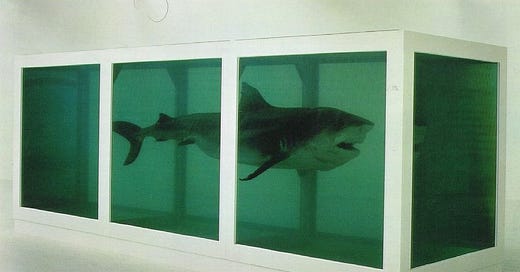🦈The Physical Impossibility of Death in the Mind of Someone Living: Rationalism Against Reason
Prophecy and Immortality are two sides of the same delusion.
Welcome to one of the final few pre-publication draft excerpts of “Stealing the Future.” Like other such excerpts and deep-dive essays, this piece is partially paywalled. Please consider becoming a supporter to read this and other pieces. A selection of book excerpts available to all readers can be found here.
That is not dead which can Eternal lie/ And with strange eons, even death may die.”
– H.P. Lovecraft, “The Call of Cthulhu”
***
The Rationalists’ certain prophecy of AI’s arrival and a Rapture of the virtuous, like the certainty of prediction baked into techno-utopianism’s political project, ultimately hinges on a set of radical beliefs, all rooted in faith rather than science. One is the conception of the human mind as a binary computer, outputs reliably following from inputs, shared by the Rationalists, EAs, Kurzweil, Barbara Fried, and many others. The second, most directly expressed by Toby Ord and Yudkowsky, but implicit in all overconfident statistical modeling, is faith in a mechanistic Newtonian model of physical reality, and the reducibility of the unknown to mere risk.
These premises are the horse behind the cart, the absurd but necessary conditions for a badly desired dream: the dream of human transcendence from pure matter into immortal spirit through technological acceleration and capital investment. More than a dream of immortal life for individual humans, or of a continuous societal wholeness, it is the dream of a human species that continues forever.
The mixture in these discourses among apocalypse and utopia, between individual and species immortality, can be mistaken for conflict or fracture. But this tension has always run through human visions of apotheosis: the new silicon reason is stretched, like a taxidermied pelt, over the ancient bones of an unspeakable terror.
These anxieties are comforted with another updated classic: the lure of prophecy, with its promise of safety. If the Spartan Lycurgus credited the vaporous Oracles of Delphi with the injunction to create a state structured by military discipline, now it is Logic that dictates conformity with the Code of Maximization, if we wish to fend off doom.
While the Rationalists try to contain the devilish consequences of their logical “infohazards,” this lure of prophecy reveals its own fatal strategy. If only we could foresee, our actions would be radically more powerful - and those with foresight would be justified in gathering to themselves vast undemocratic power.
Wouldn’t it be nice, the techno-utopian mind whispers dreamily to itself, if the world were as simple as a circuit-board. We could defeat death, and live forever. And over time, these longings become their truth.
The techno-utopians seem unaware that these whispers have been heard many times, always to end in overreach and tragedy. Perhaps they are blinded by their disinterest in storytelling, having never read of King Lear’s doomed bid to turn mathematics into legacy. They are certainly unaware that more sophisticated humans have for thousands of years recognized the inner origins of these dreams, and sought to interrogate them. St. Augustine, writing in North Africa circa 400 AD, surveyed the barely-canonical book of Revelation and saw a metaphor for the terror of personal death. In fits and starts since then, the entire human species has become more self-aware about the role our mythology plays in mediating purely animal fears.
Nonetheless, we remain in thrall to this basic terror of death, and more broadly to our own duality as creatures of both dream and body. While many of us are strong enough to honestly struggle with this duality, just as many fall victim to what Freud, in an early and imperfect metaphor, called the “Oedipal complex.” This is mistakenly understood, including by Freud himself, as some desire for vengeance against either fathers or authority. But in both Kurzweil and Bankman-Fried we see the working out of the truer Oedipal complex: the desire to become a self-created being, what Ernest Becker calls causa-sui.
To become the causa sui means not merely to kill the father, but to become one’s own father, and turn all fathers into children, as Joe Bankman was transformed; or into performing ghosts, as Fredric Kurzweil became. To overcome the natural order is the promise of the modern hero, the nature of the “Sam-shaped hole” that Michael Lewis pined for. We are attracted to these people and their missions because they allow us “to express forbidden impulses and secret wishes” - the wish for maximum power, for the cure to all ailments, for the Philosopher’s Stone, for a mind free of “bias” - even for immortality.
Keep reading with a 7-day free trial
Subscribe to Dark Markets to keep reading this post and get 7 days of free access to the full post archives.




